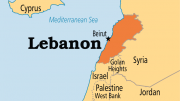There is a cynical saying that there is always a bank for every citizen in Lebanon and that the number of Lebanese bank employees is more than the number of employees in restaurants. Lebanon has traditionally been the center of the banking industry and thus, with time, the central bank has become the most important symbol of the state.
The stability of the central bank, and hence its currency, has always been the most important element of security for maintaining the state’s identity. Whatever the differences between the president and the political parties, there is something “looming” in the near future that strongly threatens this stability.
There are signs of “decisive and unprecedented” financial and administrative sanctions because of the penetration of a huge amount of dirty money that is being washed in commercial banks for the benefit of the Hezbollah terrorist organization from sources in South America and West Africa and some Arab countries, particularly Syria and Iran.
There is “irrefutable” evidence collected by the security and financial authorities of influential Western countries to prove the validity of the claims against the most important financial authority.
This reminds us of the statement by the Saudi foreign minister which “warned” about the danger to the banking infrastructure in Lebanon caused by the influx of suspicious money. It is not the first time that the official apparatus of the Central Bank of Lebanon has been exposed to a violent shock.
We all remember what happened between the Lebanese Canadian Bank and the Bank of Medina. The accusations against them were made because of suspicious accounts related to the terrorist organization Hezbollah and Syrian intelligence and sanctions shook the Lebanese markets at that time.
The famous Intra Bank
History reminds us of the disaster of the famous Intra Bank, which was discussed by the well-known Canadian-Lebanese writer Kamal Dib in two important books that focused on how dirty money entered the most important banks at the time and how bank balances were manipulated for the interests of suspicious and dangerous entities.
The researcher presented the evidence and proof that confirmed the collusion of certain personalities and the mechanisms used to commit financial abuse, which caused a huge shakeup in the Lebanese banking sector.
Now there is talk of a very important bank “involved” in manipulating the accounts of individuals and institutions that “filter” and “launder” huge amounts of money through charitable and commercial “manifestations” that have been exposed as a mere cover for drug trafficking.
Lebanon is in a state of great denial. However, the next series of sanctions will not threaten one or two banks but will touch the spinal cord of the banking system itself. This will lead to the possibility of crippling the economy and will have a devastating impact on the Lebanese lira and prices in general.
Because everything is “politicized” in Lebanon and even the central bank fails to follow and apply a policy of distancing itself from politics, the situation is fraught with danger. The next wave of sanctions on Lebanon will be serious and that is “not a joke”.
Hussein Shobokshi is a businessman and prominent columnist. Shobokshi hosts the weekly current affairs program Al Takreer on Al Arabiya, and in 1995, he was chosen as one of the “Global Leaders for Tomorrow” by the World Economic Forum. He received his B.A. in Political Science and Management from the University of Tulsa. His twitter handle is @husseinshoboksh.
Source english.alarabiya.net



Be the first to comment at "Dirty money and the coming wave in Lebanon"